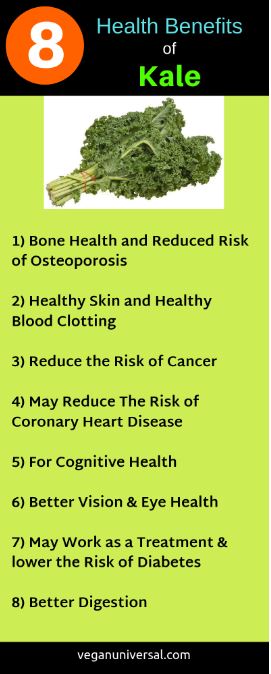
Kale that has more calcium than milk (though we will not drink it anyway), vitamin C than an orange, and at least 45 antioxidant flavonoids, it’s no surprise that vegans and health nuts alike are fond of this mighty superfood!
It has become so celebrated frequently appearing on famous food blogs and magazines and we don’t have to emphasize enough what a symbol it has become among vegans to make a statement on their tees.
Let’s see the nutrition facts & health benefits of kale to know everything that has given its celebrity status and a national day (National Kale Day) for this leafy green that packs a punch!
Nutrition Facts of Raw Kale (per 100g)
- Energy——–35 kcal
- Vitamin K——-390 μg (microgram) DV* 371%
- Vitamin A——-241 µg (microgram) RAE† DV 30%
- Vitamin C——-93 mg DV 112%
- Calcium——–254 mg DV 25%
- Manganese——-0.920 mg DV 43%
- Vitamin B6——–0.14 mg DV 11%
- Fiber——–4.1 g DV 14%
- Folate——-62 µg (microgram) DV 15%
- Magnesium——-33 mg DV 10%
- Iron——–1.6 mg DV 9%
- Phosphorus——-55 mg DV 8%
- Protein——-2.9 g DV 6%
- Vitamin B2——–0.07 mg DV 5%
- Vitamin E——–0.66 mg (ATE)‡ DV 4%
- Potassium——–348 mg DV 7%
- Vitamin B1——–0.09 mg DV 4.5%
- Omega-3 fats——-0.1 g DV 4%
- Zinc——–0.39 mg DV 4%
- Vitamin B3——–0.5 mg DV 3%
- Copper——–0.05 mg DV 2%
* daily value
† retinol activity equivalents
‡ alpha-tocopherol equivalents
Source:
https://ndb.nal.usda.gov/ndb/foods/show/11233
Health Benefits of Kale
1) Bone Health and Reduced Risk of Osteoporosis
Osteoporosis, a disorder known to have fragile bones when the body loses its bone mass or becomes inefficient in producing new bones is a serious health issue experienced by more than 10 million U.S. adults, of whom 80% are women.
Some studies have shown a link between higher vitamin K intakes and increased bone density and a reduced risk of hip fracture incidence.
The European Food Safety Authority has also validated that there is a cause & effect relationship with vitamin K and bone health establishing that a dietary intake of vitamin K could help the maintenance of normal bone.
Kale is also a rich source of manganese. Other than vitamin D & K, research has shown taking manganese with calcium, zinc, and copper may help in reducing spinal bone loss in older postmenopausal women.
2) Healthy Skin and Healthy Blood Clotting
Kale is a rich source of vitamin C which is a key ingredient used by many anti-aging skin care products.
Vitamin C is abundantly found with inner & outer layers of skin where the antioxidant properties, and its active role in producing collagen help in keeping your skin healthy.
Vitamin C has also shown to improve the effectiveness of sunscreens protecting your skin from harmful UV rays by reducing cell damage and aiding the healing process.
Kale also comes with 241 micrograms of vitamin A. In a study conducted on healthy men and women in the Netherlands showed a link between the amount of vitamin A available in blood and healthy skin.
Another important vitamin in kale for the skin is vitamin K which is vital for the process of blood clotting, which helps in healing wounds, bruises, and with areas affected by surgery.
3) Reduce the Risk of Cancer
Vitamin K1 in kale, studied by various clinical cancer trials has been found to restrain the production or treat cancer cells while the concentration of glucosinolates compounds in kale have also been linked with reduced risk of cancer.
Once consumed, glucosinolates are transformed by the digestive system to isothiocyanates (sulfur-containing compounds), which have been associated with lower risk of cancers such as liver, esophagus, stomach, colon, bladder, breast, lungs, ovaries and prostate.
4) May Reduce The Risk of Coronary Heart Disease
Leafy greens, in general, are considered to be heart healthy foods and kale stands out having a variety of antioxidants specifically being higher on vitamins K & E which are known to be healthy vitamins for your heart.
Flavonoids are also known to be heart healthy and eight studies have shown the flavonoid classes such as flavonols, flavones, or flavan-3-ols, where kale being a good source of flavonols to provide protection with regard to fatal or nonfatal coronary heart disease.
Further, matrix Gla-protein (MGP) is a protein-dependent upon vitamin K that may help prevent vascular calcification which could induce coronary heart disease.
5) For Cognitive Health
Kale is also a brain food. Its vitamin A, when substantially available in blood is associated with healthy cognition in elderly people and low levels of vitamin A seem to be a common occurrence with Alzheimer’s disease.
Another role of vitamin A is the way it guards neurons and this is shown by a recent study that found a compound from vitamin A protecting nerve cells against the damage caused by neurological diseases such as ALS (amyotrophic lateral sclerosis).
In another study, patients with early-stage Alzheimer’s had consumed significantly less amount of vitamin K with their diets than the control group with healthy cognition.
6) Better Vision & Eye Health
Other less-known nutrients though abundantly available in kale are lutein and zeaxanthin, which are two carotenoids associated with eye health, that could lower the potential of cataracts and the other leading cause of vision loss i.e. macular degeneration.
As we discussed before kale is also rich in vitamin A and did you know this valuable vitamin helps in protecting the eye surface and maintains eye health in general? Vitamin A, along with other antioxidants could help in reducing the risk of vision loss and when it’s combined with lutein in kale, it could extend the vision of people affected by retinitis pigmentosa (RP).
7) May Work as a Treatment & lower the Risk of Diabetes
Manganese in kale may play a role in blood sugar regulation. A high proportion of manganese is present in the pancreas which produces insulin to regulate blood glucose. Therefore manganese may play a role in effective secretion of insulin and to have normal blood sugar levels.
Kale also comes with an antioxidant known as alpha-lipoic acid and according to studies it can assist in lowering glucose levels, and improve insulin sensitivity in patients with diabetes.
8) Better Digestion
High fiber and water content in kale can assist digestion in general, prevent constipation & diarrhea and contribute towards healthy and regulated digestion.
Kale also has B vitamins which help in getting energy from food, vitamin C that helps absorbing iron and vitamin A which may help prevent digestive tract diseases such as Crohn’s.

Conclusion
Looking at all these health benefits, it’s quite clear that kale is a superstar you can add to your diet.
Having said that, like most things in life, we suggest consuming it in moderation to have the best that kale has to offer.
You can have it steamed or cooked, few times a week but if you’re juicing, it’s advisable to have it just once a week due to its raw state.
As much as possible go for organic produce, if not make sure to wash it thoroughly to remove harmful pesticides.
Recommended Posts:
- Health Benefits of Green Tea
- 10 Best Herbal Medicines
- Health Benefits of Spirulina
- Health Benefits of Tofu
Reference:
https://www.ncbi.nlm.nih.gov/pubmed/18214692
https://www.efsa.europa.eu/en/efsajournal/pub/1228
https://www.ncbi.nlm.nih.gov/pubmed/8027856
https://www.ncbi.nlm.nih.gov/pubmed/19027415
https://www.ncbi.nlm.nih.gov/pubmed/12540393
https://www.ncbi.nlm.nih.gov/pubmed/19027415
- Like
- Digg
- Del
- Tumblr
- VKontakte
- Buffer
- Love This
- Odnoklassniki
- Meneame
- Blogger
- Amazon
- Yahoo Mail
- Gmail
- AOL
- Newsvine
- HackerNews
- Evernote
- MySpace
- Mail.ru
- Viadeo
- Line
- Comments
- Yummly
- SMS
- Viber
- Telegram
- Subscribe
- Skype
- Facebook Messenger
- Kakao
- LiveJournal
- Yammer
- Edgar
- Fintel
- Mix
- Instapaper
- Copy Link
Get free updates on vegan articles, news, recipes, and much more...


Leave a Reply